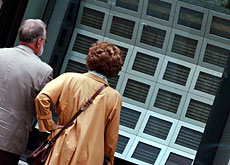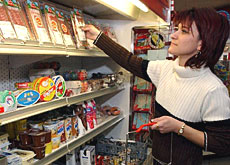Iraq crisis weighs heavily on Swiss economy

The "State of the Union" address from President George W Bush has increased uncertainty within the Swiss economy. The Swiss Market Index is at its lowest level since February 1997.
And Swiss exports are suffering from the impact of the strong Swiss franc.
The Swiss National Bank has responded to the mounting crisis, saying it can and will act should deterioration in either economic or geopolitical conditions warrant a move on interest rates.
Emphasising that the central bank was closely monitoring events, spokesman Werner Abegg told swissinfo: “We make our decisions on a day-to-day basis.
“We are not making any preparations in case of war. We are continually observing the financial markets because that is our daily task.”
Although interest rates in Switzerland are currently extremely low, National Bank president Jean-Pierre Roth insists there is still some room for manoeuvre.
“We are sometimes accused of using [up all] our ammunition. But we do so because we feel it is necessary under the current circumstances,” he told the financial magazine “Bilan”.
“But the possibility to react remains, given that the three month Libor [London Interbank Offered Rate] still stands at around 0.75 per cent,” he added.
Action plan
Commenting on Roth’s remarks, economist Jean-Claude Manini at the Geneva bank, Lombard Odier Darier Hentsch, told swissinfo that the National Bank was clearly signalling that it would take action in case of crisis.
“If the actors within the economy take fright and the Swiss franc takes on the role of a currency of safe haven, it [the bank] will move, either by intervening on the exchange markets or by another means,” he said.
Roth has said that in the event of war in Iraq, the Bank would use all its means to avoid the franc taking on a safe haven role and appreciating.
“We don’t rule out that the National Bank will intervene on the exchange markets. We haven’t used that option in past years but we could do so should the market destabilise,” he said.
“If we deem it necessary to involve other central banks, we will do so. Otherwise, we will act alone. It’s up to us to decide,” he added.
Asked about a possible pegging of the franc to the euro, analyst Bernard Lambert at Pictet bank in Geneva said this was an option of last resort because the National Bank had other means to prevent the franc appreciating.
“It can still lower interest rates even though the margin for manoeuvre is slender, it can intervene on the exchange markets by buying dollars or euros with Swiss francs or temporarily linking the development of the franc to that of the euro,” he said.
Exporters under pressure
Switzerland’s main exporters, who are coming under pressure because their products are increasingly expensive in target markets, have raised concerns about the strong franc for months.
In November, the engineering industry, Switzerland’s key exporter, warned that its members remained under “severe pressure” from the global economic crisis.
Earlier this month, Thomas Daum, the director of the industry’s umbrella organisation, Swissmem, described the Iraq problem as a “sword of Damocles hanging over everything.”
He added that a further weakening of the dollar against the Swiss franc would have “serious consequences” for Switzerland.
“We are in close contact with the Swiss National Bank and we hope that it will do all it can. We appreciate Mr Roth speaking of possible intervention on the foreign exchange market,” Swissmem spokeswoman Dorothea Tiefenauer told swissinfo.
Weak economy
Commenting on the state of the Swiss economy in general, Roth said that he was “very worried” because there was an “enormous risk” of further weakening.
“We are afraid of a repeat of the 2002 scenario: optimistic expectations that don’t take shape. We are currently experiencing a global sentiment crisis and the uncertainties about a possible war in Iraq are poisoning the environment,” he told Bilan in its February edition.
Switzerland’s leading economic indicator for December – which was published on Wednesday – was slightly higher but showed that any upturn would be elusive.
Economic researchers at the Swiss Institute for Business Cycle Research in Zurich said that the indicator signalled a practically stagnant GDP growth rate for the fourth quarter of 2002 and the first quarter of 2003.
swissinfo, Robert Brookes
The Central Bank says it is ready to cut interest rates to boost the economy and drive down the value of the franc.
But its room for manoeuvre is seen as limited because rates are already so low.
The Bank is not ruling out asking other Central Banks to help by selling francs.
Switzerland’s key exporter, the engineering industry, has warned that a further weakening of the dollar against franc would have “serious consequences”.

In compliance with the JTI standards
More: SWI swissinfo.ch certified by the Journalism Trust Initiative








You can find an overview of ongoing debates with our journalists here . Please join us!
If you want to start a conversation about a topic raised in this article or want to report factual errors, email us at english@swissinfo.ch.